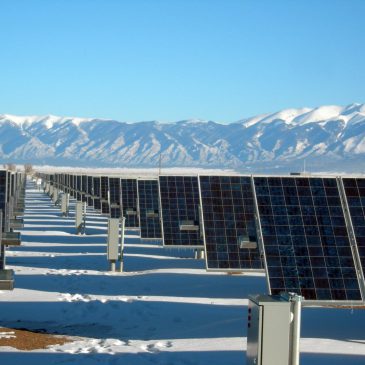Using Solar Power When You Can’t Control the Weather
It’s a common question to ask before you invest in switching to solar power. After all, it’s a big commitment! Luckily, solar panels that simply don’t work as well in inclement weather is one of the biggest myths about solar power around. Let’s get this out of the way up front: to put it simply, yes, your solar panels will work in cloudy or bad weather. However, they may be operating at a slightly decreased level of efficiency.
How and in what ways your solar panels are affected will be determined by the type of bad weather, if your solar panels are properly maintained, and how you’re able to compensate for what weather comes your way. Here’s what you can expect in every type of bad weather when it comes to the efficiency and functionality of your solar panel system.
Clouds & Rain Affecting Solar Panels
Just as you would expect, solar panels are at peak performance on clear, sunny days. However, photovoltaic panels are designed to generate electricity from both direct and indirect sunlight. So even if the sun is partially blocked by clouds, you’re still producing energy. However, if the cloud coverage is very dense, then those panels may only produce 10 to 25% of their usual capacity.
Fog and Solar Power
Contrary to what you might think, fog has actually been shown to produce greater power generation from solar panels. This is because fog causes the sun to hit the solar panels at more obtuse angles, allowing for even more sunlight to reach them than would in simple, direct light. This is definitely some good news for those fog-heavy areas of the country!
Cold Weather and Solar?
When it comes to solar power, the colder, the better. Solar panels generate less electricity from the same amount of sunlight when operating in higher temperatures. The solar cells inside the panels will begin to degrade when they get hot, making them far less efficient. Computers and any other electronics that use semiconductors also experience the same loss in efficiency. This is why some of the best energy production comes from states like Colorado that have a lot of cold, sunny days.
Getting the Most From Solar Panels in Snow
Winter weather is generally a rather optimal time for solar power. White snow can reflect sunlight and improve performance, as long as the panels aren’t covered in snow. While the snow will usually slide off the panels on its own, any buildup can simply be brushed off. Don’t let winter weather discourage you from switching to solar power!
What About Solar Panels in a Hail Storm?
Your solar panels can be damaged in heavy hail storms, but it is very rare. Solar panels are very durable and built to withstand harsh weather conditions. They have even gone through simulated hail testing, which involves hitting the panel with a 1 inch steel ball at terminal velocity. Suffice to say, it would take a pretty extreme hail storm to cause damage to your solar panels.
We’ve Hear of Wind Power, But Can Wind Affect Solar Efficiency?
As long as you use a reputable solar power installer to properly secure your panels, wind damage is rare. Even after Hurricane Sandy hit in 2012, solar companies found that their customers solar panels held up very well against the storm.

